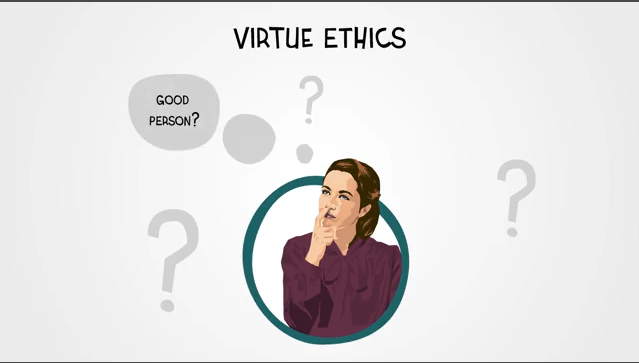Virtue ethics is the next approach that we will cover. This brand of ethics does not aim at establishing codifiable universal principles that would amount to a decision procedure for determining what the right action would be in any given case, but rather focuses on the role of virtues and the character of a person. It has its origins in ancient Greek philosophy, in the thought of Socrates, Plato and Aristotle.
A key question in virtue ethics is how to mould individual character based on models of virtue, or to put it more simply: How can we become a ‘good person’? (Athanassoulis, n.d.; Plaisance, 2014: 24). One should strive to develop a ‘virtuous character’. This entails a much broader perspective than the other two approaches, which focus on specific ethical dilemmas that need to be solved.
A virtue may be considered a character trait, but it is more than this: it is entrenched in the mindset of a person. Virtues are visible in the considerations one has when taking action, which is different from using – for example – deontological rules in ethical behavior. For example, a courageous person is one who values courage, not because they say they do, but because they take considerations regarding ‘courage’ into account when thinking about what to do in a certain situation. In this sense, a courageous person tries to strike a balance between being reckless and cowardly. This is called the doctrine of the mean: virtuous behavior is about finding a balance between excess and deficiency, depending on the situation (Plaisance, 2014). Practical wisdom, which comes with life experience, helps a virtuous person when making such decisions; it helps us to reason in a good way.
But why would we do this? Aristotle’s answer is Eudaimonia, which is difficult to translate but is commonly described as ‘living well’, ‘welfare’ or ‘human flourishing’ – the highest end of human life. Alasdair MacIntyre, who can be considered a contemporary virtue ethicist, also argued that virtuous behavior applies to society as a whole: a life well lived contributes to a flourishing society.
So, if our characters reflect virtues, we will not only serve ourselves. It is also essential and beneficial to society as a whole. In this regard, MacIntyre identifies external goods (later reformulated as goods of effectiveness) that are not specific to a practice and can be obtained in several ways. Examples of such goods are power and money: in the case of money, you can become richer by working more, by saving or by inheritance. He also identifies internal goods (later reformulated as goods of excellence) that – I quote – you can ‘only obtain through a particular practice’ and which have as a characteristic that ‘their achievement is a good for the whole community who participate in the practice’. Each practice has an overriding end, its telos.
For example, if you want to improve the reputation of your organization by external communication, then you need to engage in this kind of communication. If this is practised in a good way, the organization and its stakeholders will benefit from it. The ‘community’ of practitioners in corporate communication can learn from this as well and, consequently, develop their own external communication skills. A virtue in this sense is an ‘acquired human quality’ that enables us to achieve internal goods (MacIntyre, 1981). To put it very short, while you get socialized in your practice as a communication professional, you will practice your virtues, strive at internal goods, deliver good communication ‘products’ and thus serve our common good.
